Interview about Tubular Bells 2003 by Robert Silverstein
(Enviado por jaimixx)
Thirty years ago Mike Oldfield arrived on the music scene with his debut solo album, the ceremoniously titled Tubular Bells. The fact that it was the first album release on Virgin Records—coupled with it’s implementation in the original Exorcist movie—made it among the most auspicious album debut’s from the year 1973. Having sold well over 15 million units since then, Tubular Bells has historically proven to be Oldfield's most enduring and popular work. In the spirit of Tubular Bells several fine ‘70s solo albums followed, including Hergest Ridge (1974) and Ommadawn (1975), in addition to a trendsetting 1977 Virgin Records Lp featuring Oldfield teamed with Finnish bassist / composer Pekka Pohjola. Closing out the ‘70s with his 1979 album Platinum, Oldfield set a new standard of musical excellence with his 1980 masterpiece QE2. One of the most important instrumental rock albums of the past 23 years, QE2—featuring the excellent production of David Hentschel and key contributions from Genesis drummer Phil Collins—was the album that catapulted Oldfield into the rock arena and was the perfect predecessor to his 1982 masterpiece 5 Miles Out. Other critically acclaimed, vocal-centric rock albums such as Crisis (1983), Discovery (1984), Islands (1987) and Earth Moving (1989) followed throughout the ‘80s, and in 1992 Oldfield—now signed to Warner Music worldwide—released the long awaited follow up to his original masterpiece, Tubular Bells 2. Despite having released several key albums on Warners—including The Songs Of Distant Earth (1994) and Voyager (1996)—during the second half of the ‘90s, Mike’s music didn't come close to seeing U.S. release. Although in 2003 that’s about to be changed and hopefully, it’s a case of better late than neve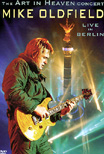 r... Firstly, Oldfield entered the new millennium in style with his 2000 studio CD masterpiece, The Millennium Bell, released in England at the end of ‘99. A splendid tribute to honor / enter the new millennium, the MB CD found Oldfield united with a number of gifted players including singer Miriam Stockley. As good as The Millennium Bell CD is, the Millennium Bell concert DVD—entitled The Art In Heaven Concert—finally released in the U.S. in mid 2003 on L.A.-based Image Entertainment, really captures the essence of Oldfield live on stage in Berlin on the evening of December 31st, 1999. Featuring selections from The Millennium Bell CD and the original Tubular Bells—as well as favorite Oldfield rockers like “Moonlight Shadow” and “Shadow On The Wall”, the DVD is further enhanced by an illuminating interview with Mike. One of the most spectacular concerts and fireworks light shows ever filmed, the DVD finally gives American viewers the chance to see this legendary musical icon in rare form. Following the release of his 1998 CD Tubular Bells 3 and the 1999 release of Guitars, Oldfield returned in 2002 with Tres Lunas—one of his finest, most assured musical works. Oldfield’s approach to instrumental rock music has really matured since the heyday of QE2 and 30 years after the initial impact of the original Tubular Bells, Oldfield is ready once again to unveil his latest masterpiece—a true to life rerecording of his original instrumental rock classic called Tubular Bells 2003. Released on CD and 5.1 DVD Audio on Warner Music in Spain, the album is also finally set for release in the U.S. on Rhino Records in August 2003. The CD is already creating quite a buzz among Oldfield followers worldwide and will surely prove to be among the key music and album events of 2003. During his interview with Robert Silverstein for 20th Century Guitar and mwe3.com on the morning of April 14, 2003, Mike discussed the early Virgin Records years, The Millennium Bell DVD, his guitars and his new recording, Tubular Bells 2003.
r... Firstly, Oldfield entered the new millennium in style with his 2000 studio CD masterpiece, The Millennium Bell, released in England at the end of ‘99. A splendid tribute to honor / enter the new millennium, the MB CD found Oldfield united with a number of gifted players including singer Miriam Stockley. As good as The Millennium Bell CD is, the Millennium Bell concert DVD—entitled The Art In Heaven Concert—finally released in the U.S. in mid 2003 on L.A.-based Image Entertainment, really captures the essence of Oldfield live on stage in Berlin on the evening of December 31st, 1999. Featuring selections from The Millennium Bell CD and the original Tubular Bells—as well as favorite Oldfield rockers like “Moonlight Shadow” and “Shadow On The Wall”, the DVD is further enhanced by an illuminating interview with Mike. One of the most spectacular concerts and fireworks light shows ever filmed, the DVD finally gives American viewers the chance to see this legendary musical icon in rare form. Following the release of his 1998 CD Tubular Bells 3 and the 1999 release of Guitars, Oldfield returned in 2002 with Tres Lunas—one of his finest, most assured musical works. Oldfield’s approach to instrumental rock music has really matured since the heyday of QE2 and 30 years after the initial impact of the original Tubular Bells, Oldfield is ready once again to unveil his latest masterpiece—a true to life rerecording of his original instrumental rock classic called Tubular Bells 2003. Released on CD and 5.1 DVD Audio on Warner Music in Spain, the album is also finally set for release in the U.S. on Rhino Records in August 2003. The CD is already creating quite a buzz among Oldfield followers worldwide and will surely prove to be among the key music and album events of 2003. During his interview with Robert Silverstein for 20th Century Guitar and mwe3.com on the morning of April 14, 2003, Mike discussed the early Virgin Records years, The Millennium Bell DVD, his guitars and his new recording, Tubular Bells 2003.
Robert Silverstein: RS
Mike Oldfield: MO
RS: Mike!
MO: Yes.
RS: It’s Robert Silverstein from 20th Century Guitar magazine and mwe3.com. How’re you doing today?
MO: Fine thank you.
RS: I want to say top of the morning to you!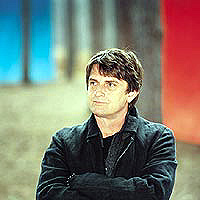
MO: Top of the morning to ya! (laughter)
RS: Where I am anyway. I hope my phone doesn’t break up. I’m using one of these low-tech Radio Shack jobs.
MO: Telephone? (laughter) Oh, really? It’s not good quality but I can hear you.
RS: You can hear me right?
MO: Yeah, it’s alright, yes.
RS: Excellent to be speaking with you! I’m a huge fan of yours. It’s amazing, we’re the same age now!
MO: Oh...so you know what I’m going through! (laughter) You’re approaching 50?
RS: I just turned 49 so I’m like nine months younger than you. You’re approaching another milestone!
MO: Another. Another one, yeah. It starts off at 30 and then 40’s a big one and then oh my god, 50? What’s that like? Oh well, we’ll get through it!
RS: I’ve been enjoying your music for just about 30 years and I want to get to the new Tubular Bells 2003, but first I want to tell you...the first interview I ever did was with someone I hope you remember, Pekka Pohjola who I interviewed in Finland at the Sibelius concert hall during the summer of 1980.
MO: Yes. hmmm.
RS: This may come as a surprise to you, but I still consider Mathematician’s Air Display, the album you recorded with Pekka and also featuring your sister Sally, in late 1976 to be one of my fundamental musical influences. Last year I wrote the liner notes for the Love Records CD reissue of that album. (editor - reissued on CD in 2002 with the original Finnish title, Keesojen Lehto)
MO: Oh, did you?
RS: During my 1980 interview with Pekka he told me that you had heard his second solo album B The Magpie and were pretty impressed with it and it sort of evolved from there.
MO: It’s a long time ago, you know? I remember I was contacted by Virgin Records, somebody at Virgin saying that they were looking for musicians to collaborate with and they suggested this Finnish bass player called Pekka Pohjola. And first of all, he came to see me at the Manor and he brought me some black Finnish bread and some cheese, which I’d never tasted before. It was (laughter) a very special kind of bread! Then, he was making an album and he came over with the tapes, to my house and spent three or four days working on it, playing some guitar, a bit of mixing on it. I think most of it was already done somewhere, probably in Finland. So he brought the tape and I just overdubbed on it. Subsequently, when I did my first big tour, I think it’s in 1979 or ‘78, (I was) looking for a bass player, so he agreed to come on tour around Europe, a European tour. A big band there, about 60 people.
RS: That tour was captured on the double Exposed album?
MO: Yeah...I remember I was quite pleased with the track that we did together. There was one especially that I really liked. I can’t remember the name of it now.
RS: I think you’re talking about the title track to Mathematician’s Air Display?
MO: Yeah, could be.
RS: The title track to that album?
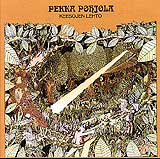 MO: Yes, yes. It could be. I was quite happy with that. I think I played some nice guitar. I remember there was just a sequence of chords with a nice bass line. We knitted it all together with the guitar melody, which was quite nice. And then, after that tour I sort of lost touch with him! And the last I saw of him was in 1979!
MO: Yes, yes. It could be. I was quite happy with that. I think I played some nice guitar. I remember there was just a sequence of chords with a nice bass line. We knitted it all together with the guitar melody, which was quite nice. And then, after that tour I sort of lost touch with him! And the last I saw of him was in 1979!
RS: That’s when I first went to Finland to meet him.
MO: Ah.
RS: To my surprise your brilliant guitar performance and production work on that album paved the way towards the guitar-based rock sound that would soon became the primary focus of Pekka’s solo albums.
MO: hmmm.
RS: And your sister Sally was great on that album too.
MO: Did Sally sing on it?
RS: Yes on the song “Hands Straighten The Water”.
MO: Yes! (laughter) I couldn’t remember, sorry! I remember the melody, but I can’t remember the track.
RS: She sang so beautifully on that and then your guitar came in on then end with this huge crescendo of sound!
MO: Do you know what Pekka Pohjola’s doing now?
RS: After 1979 I started a record label in New York and I released four of his albums here on Breakthru’ Records. He released a new album a couple years back. It’s a little different, more spatial sounding but it’s still quite good. Wow what if I could hook you guys back up?!
MO: Actually, I think my memory is wrong about that track! Wasn’t Pierre Moerlin on that track?
RS: Pierre Moerlin played incredible drums on the “Mathematician’s Air Display”.
MO: Oh! Then I recorded it as well!
RS: You were the engineer as well.
MO: Okay, now I remember, yes.
RS: That album you made with Pekka really changed my life.
MO: Hmmm... (laughter) That sounds positive.
RS: I want to get to the new stuff. But, looking back on the early years at Virgin Records it kind of seems like a dream. Just the sheer roster of talent like Robert Wyatt, Hatfield & The North and Gong. It was awesome. And alot of these guys, Robert Wyatt and Fred Frith and Steve Hillage were buddies of yours.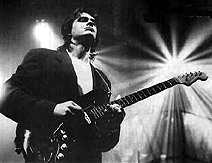
MO: Well, I certainly remember Robert Wyatt. Of course, I was the bass player in Kevin Ayers And The Whole World and he joined us for nearly six months or so. So, I was playing bass to his drums which was quite an experience. And it was just great because he’d be playing along in a really good feel and everything and just suddenly, he’d go crazy and he’d be playing it like it was an avant gard percussion instrument! I would have to keep the bass line going to keep the song going and wait until he’d decide to rejoin the rhythm, which he would do beautifully, he’d come straight back into it. It was completely unpredictable and he was a wonderful drummer.
RS: He was brilliant.
MO: He really was.
RS: I love the Soft Machine, especially Volume Two...
MO: There was a beautiful film, I don’t know whether you’ve seen it in New York. It’s a French film. It’s about the migration of geese. It’s called Le Peuple De Immigranteur and Robert Wyatt’s music is featured on it quite a bit. Very, very beautiful film. Just released in France last year.
RS: Everyone on Virgin was making such great music. You couldn’t choose sides. Simon Draper helped Richard Branson find some of those great artists for the Virgin label. Could you say something about Simon?
MO: Well it was Simon Draper who really gave me my first opportunity. ‘Cause he was Richard’s partner along with another guy called Nick Powell, in the very early days. And it was Simon who really...he said, ‘okay, let’s give this guy Oldfield a chance’. And in the early days, he was very supportive. Then, I haven’t heard from him since Virgin was sold to EMI, and then what he does now. He was the real day to day boss at Virgin where as Richard was more the public relations sort of thing and business. Simon dealt with the musicians and the music.
RS: I don’t want to dwell too much on Virgin Records but then I started thinking that without Tubular Bells I might not have gotten to hear Pekka Pohjola’s music.
MO: No, I suppose if Tubular Bells had not been successful perhaps they’d have missed out on all that and gone straight to punk! (laughter)
RS: Imagine that. Would’ve changed my whole career!
MO: Changed your life!
RS: Because after that mid to late ‘70s burst of creative brilliance, the more interesting your music became, the less interesting Virgin Records became.
MO: Well, it’s very nice of you to say that, thank you.
RS: Your version of Jerry Lordan’s “Wonderful Land” from QE2, which I first heard in June of 1981, was the song that single handedly introduced me to the music of The Shadows.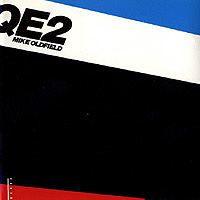
MO: Oh! The Shadows! I tell all these people the only guitarist I ever wanted to meet in my whole life was Hank Marvin. And I finally did one day!
RS: I was living in Sweden in early 1981. I had been there several times in '79 and '80 and in April 1981 I moved there. I was pretty shattered by Lennon’s 12/8 murder. I had just moved into a new apartment a few blocks away from the Dakota... next to Lincoln Center, where my family owned a restaurant, I was reading you arrived in NYC the day he was killed?
MO: Yeah, it was just one of those coincidences...you know? My first trip I think, or second trip. I came there to do a bit of...I hired some session musicians and we worked on an album that became called Platinum. I was just looking at your web site here, tcguitar.com. I just recognized two of my guitars straightaway from there. The wooden Telecaster which is what I used on Tubular Bells mostly. I’ve got Marc Bolan’s old Telecaster. And the pink Stratocaster which I use kind of alot. It’s funny, it’s got two of my favorite guitars straightaway.
RS: So you arrived in New York on December 8th?
MO: Yes, I arrived that evening, yeah. (big sigh)
RS: That’s like, uncanny almost.
MO: Yeah, isn’t it?
RS: Bo Hanson guitraist Kenny Håkhanson told me about Hank Marvin in Stockholm the Spring of 1981 and then his friend Stig Vig from the pop group Dag Vag played me QE2 and I heard your version of “Wonderful Land”. And I said ‘what is that?’
MO: Hmmm. That was a big hit in Australia for some strange reason. I don’t know why! (laughter)
RS: QE2?
MO: Yeah, they liked that in Australia. My version of “Wonderful Land”. Suddenly I was very hot in somewhere like Adelaide!
RS: After I heard your version of “Wonderful Land” I heard the Shadows’ version and the nostalgia element was just so incredible. Just at that moment it really opened me up to The Shadows.
MO: Hmmm.
RS: Anyway, I always wanted to thank you for making that incredibly beautiful version of “Wonderful Land”—that song just about saved my life in 1981. In retrospect what made you choose to cover “Wonderful Land” in 1980?
MO: Hmmm. Well, it could have been Simon Draper! I was a couple tracks short for the album and I asked him if he had any ideas and I think he said, ‘why don’t you try doing a version of that.’
RS: I guess The Shadows always had a huge influence on you...
MO: I was very young. 10, 11, 12...and I saw Hank Marvin and I thought, ‘God, I want to be like that!’ (laughter) But I wasn’t so tall and thin and I didn’t wear glasses, but I’d got the guitar anyway.
RS: After Kennedy got killed it was like we were saved by Beatlemania and we never heard The Shadows here.
MO: Really.
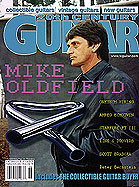 RS: I think the first instrumental rock album from England that had an impact here in America was Tubular Bells.
RS: I think the first instrumental rock album from England that had an impact here in America was Tubular Bells.
MO: Was it?
RS: What did you think about the Shadows’ cover of your 1983 hit “Moonlight Shadow”? (ed. - In fact they called the 1984 album it appeared on Moonlight Shadows!)
MO: Oooh! I was very pleased about that! I still hear that sometimes, in restaurants. They have this Shadows’ compilation album. So, I’ll wait for my check to come along. Yeah! It was great, yes.
RS: Did you ever get to speak to Hank about that or “Wonderful Land”?
MO: Yeah, I met them at a theater one day. We were on the same show. I met Bruce...was it Bruce Welch? Yes, Hank Marvin and all that...he told me they’d done a cover. I said, ‘I know, I heard it, very nice’.
RS: I know Hank lives in Australia now.
MO: Yeah.
RS: So this is the 30th Anniversary of Tubular Bells.
MO: Yes.
RS: The first version of Tubular Bells came out 30 years ago on May 25, 1973. I can’t wait to hear your new version of Tubular Bells, called Tubular Bells 2003, which is coming out next month. Warners Music in Spain is putting it out?

MO: Yes. It sort of nearly went to Virgin but at Virgin, there’s no Simon Draper, there’s no Richard Branson. There’s all new people, it’s part of EMI. And for some reason, I’m very popular in Spain and I like very much the Spanish people. The record company, they seem very down to earth, you know they’re very respectful, very nice people. They do a good job so I went directly with them. And it’s been a great pleasure working with them. You know the whole record business is in a bit of trouble at the moment because of things like the internet. People come and go so quickly. You just start to get to know somebody and then they’re gone six months later. I like working with the Spanish and you know Europe is almost like one country now so it doesn’t really matter which part of it you’re from. And the English record business is sort of looked at with a little bit of ridicule nowadays because of all these manufactured pop bands.
RS: You describe the making of Tubular Bells 2003 as ‘the least stressful project I've had for ages’.
MO: Yeah, it’s true.
RS: And you say ‘I’m deliberately not hurrying as I only have one chance to do it as perfectly as possible.’
MO: Yeah, I didn’t want to finish it! I’m a bit depressed now it’s gone. (laughter) I’ve got post-album depression.
RS: I heard you were splitting your time between music and your hobby of radio controlled electric model helicopters. What’s that like?
MO: Well I used to fly model airplanes with my father and I did some flying on real helicopters. But it’s much too stressful, ‘cause I hate heights, you see. I was looking for a hobby. I wondered, ‘what can I have as a hobby?’ So I looked into radio controlled model helicopters. I’m building the world’s smallest jet engine, a real jet engine. It’s about the size of...a small dog (laughter). I’m building that at the moment. They’re not toys really. They’re very sophisticated. They have little micro-computers, use jet fuel, you have to wear hearing protection from them. It’s about two meters across. You can’t sit in it but you can probably take your dog up and fly with it or something. (laughter)
RS: John Cleese did the spoken word part on the Tubular Bells 2003 album?
MO: Well yeah, we did it while I was speaking to him on the phone. He was in Santa Barbara. He’s such a lovely man. He’s just the nicest Englishman, you know, proper and polite and everything. It’s just lovely to work with him. And then we did all kinds of different versions of all the words, the announcement of the instruments. And then got them sent over and edited them together. It was great. I mean there’s very few people who could replace Vivian Stanshall, but John Cleese was one.
RS: You say that, ‘I knew that Tubular Bells was a record perfectly suited to the breathtaking capabilities of today´s studio technology.’
MO: Yes, it is.
RS: In what way was the rerecording of the music influenced by these great leaps in technology?
MO: Two things. One is the digital editing. I can do ten takes of one guitar and easily cut and paste the best bits of them together. And the other thing is with the mixing. Tubular Bells One was very difficult to mix because there was no automation. Now you set everything up and the computer remembers every little thing you do. This is especially useful for the 5.1 mix which is coming out. There’s an AudioDVD in a couple of months. That’s really something. Things move around. Because it’s instrumental, you don’t always have to have the vocalist at the front, you know? At the beginning, all the instruments slowly rotate around you like you’re on a carousel and in the “Hornpipe” at the end they all do this kind of Scottish square dance around your head (laughter) that’s really fabulous.
RS: And there’s also a DVD video accompanying the CD and 5.1 mix of the new Tubular Bells 2003.
MO: Yeah...that has selections of the 5.1 mix, little tastes of it. It’s got a video with a sort of single version of one of the tracks. And it’s got information about the making of it written by the assistant engineer. All this kind of stuff...
RS: And I hear there’s a new four disc box set called The Complete Tubular Bells Collections containing the new TB2003 version and the Tubular Bells 2 & 3 versions as well.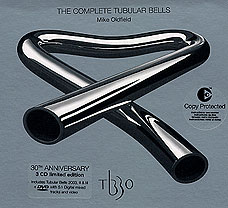
MO: That’s right, yes.
RS: So it looks like it’s going to be a tubular 2003!
MO: A tubular year, yes (laughter).
RS: TB2003 is a 17 part CD with 17 programmable tracks?
MO: Yeah, well this is only because of the advent of the CD because it’s difficult for people to wind and rewind when you can’t pick up the needle so I worked on it in sections. And so I made the individual sections into tracks...just a matter of putting a little cut point on the mastering. I purposely didn’t give them fancy titles like on Tubular Bells 2...like “Moonshine”. They’re the working titles. They’re the titles...that I’d say to the engineer, ‘okay I want to work on the “Russian” bit now’. So we’d flip to those set of files. It’s a simple convenience for people to be able to find the right part. There’s no big mystery to it.
RS: Was that an idea you had in 1973 but couldn't do on the original Tubular Bells?
MO: No, I didn’t want it to have tracks. It didn’t have tracks. This one myself...sometimes I feel like listening to the end of part one. I can flip to it now on the CD. In the old days I would have picked up the needle and dropped it on. (laughter)
RS: How much of the original 1973 state of mind returned while rerecording the new Tubular Bells 2003?
MO: No...I was happy to do without that state of mind. (laughter) I was in a really horrible state of mind at the time. Things are alot calmer now.
RS: Is there going to be a premiere event or big party to launch the release of Tubular Bells 2003?
MO: Yes, well we’re planning to do a series of them across Europe. In England it looks like we’ll do it at Abbey Road studios. There’s nothing at the moment planned for the States although I would love to come there. I don’t know if you saw me...when was it, ‘92 in New York?
RS: I did. I was at Carnegie Hall (in early March 1993).
MO: Oh it was great. That was one of my all-time favorite concerts that was! I loved it.
RS: I remember it was completely sold out.
MO: It was fantastic. I would love to do something, but things have been quite quiet in the States for me in the last few years.
RS: It’s terrible...it’s a shame.
MO: I don’t know why...
RS: I don’t know. It’s pretty scary here now. I keep thinking of that King Crimson song “21st Century Schizoid Man”.
MO: Yes, it’s nearly come true, hasn’t it?
RS: It would be great to see you come to New York to do some shows!
MO: I did have one good supporter there. I’ve forgotten his name. He was a DJ on one of the New York radio stations. He was an older gentleman. Very nice. Is he still active?
RS: Scott Muni?
MO: That’s him, yeah!
RS: He must be 70 years old!
MO: Yeah...(laughter).
RS: He was the first FM radio DJ. I remember him from way back in 1968.
MO: Is he still active or is he retired?
RS: To be honest, I don’t listen to the radio much.
MO: Yeah, Scott Muni...that’s the guy. He was nice.
RS: So you’re going to unveil Tubular Bells 2003, in Europe?
MO: Yes but it’s just presentation. We’ll hire the best sound systems with 5.1 sound system and have playback, just say hello and do a few interviews. That kind of thing.
RS: The Millennium Bell concert which is finally coming out in the U.S. on DVD on the L.A.-based Image Entertainment is totally brilliant.
MO: That was quite an event, I can tell you.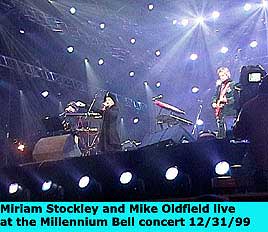
RS: I was completely bowled over by the sheer magnitude of it. We don’t have those sort of things here in New York anymore.
MO: Well you had Central Park not too long ago, didn’t you? Wasn’t that similar?
RS: Yeah, sometimes good things happen here but there doesn’t seem to be much lately...You’ve described the Millennium Bell CD as your penultimate album but I think the live in concert DVD is superior, and I consider it to be the definitive version of the work, fireworks and all.
MO: And all the Russians!
RS: So the orchestra and choir were Russians?
MO: Yeah! I couldn’t believe it when I met them. All these women with these strange sort of cone-like dresses. Best thing I liked about the Russians is they called me ‘maestro!’ That was very respectful. I like that.
RS: You’ve said you were commissioned by the Germans to do the live concert in Berlin?
MO: No. They tried to get David Bowie to do the concert and I have the same concert agent as David Bowie. He didn’t want to do anything on the Millennium so he suggested me. And I nearly finished the Millennium Bell (CD) so I agreed to do it. We sort of worked together to make the show because I was making a piece of music about the Millennium anyway. And they came along, these ‘Art In Heaven’ people. Very talented, very interesting people. They all dressed in black leather, with dark sunglasses and white faces. Looked like The Adams Family! (laughter) I remember they all had these tiny little mobiles. They were always talking in German into them. I remember the lighting director kept saying, ‘the music has to be Monumental!, Monumental!’ He kept saying, waving his arms around. Then I made him a special piece of music for his light show which had a bit of the Beethoven in it and all this stuff.
RS: That’s the “Art In Heaven” instrumental track that’s also featured on the Millennium Bell DVD?
MO: Yeah, that’s right...
RS: What an incredible job you did on that! That freaked me out watching you play that Beethovania thing at the end. Wow!
MO: (laughter) That was the last concert I did. I’m not sure I could do a bigger one, more impressive than that. That one was really...fantastic. I’ll tell you the thing that I remember most about that was, we had to wait because we needed to time the music to the midnight. So we had the whole band and orchestra on the stage waiting and I was sort of walking around waiting for the cameras, waiting for the guard. I sat down and I roll my own cigarettes, y’know it’s just tobacco. And I sat down on my stool in the middle of the stage and I rolled up a cigarette and about a hundred thousand people started cheering (says loudly) and shouting! I think they thought I was rolling some kind of joint or something! (laughter) But it’s just my normal tobacco. So I thought if I can get a standing ovation for rolling a cigarette what’s the concert gonna be like!
RS: The Millennium Bell DVD also turned me onto Miriam Stockley who’s a great singer.
MO: Yes. There was a very good “Moonlight Shadow” that night if I remember.
RS: Yes I love her new album on Narada.
MO: hmmm...
RS: The Tres Lunas album actually came out in 2002 in Spain on Warner Music and it was never released here.
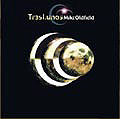 MO: Didn’t it? Well I hope that the Tubular Bells 2003 will come out there. Do you know if it’s scheduled for release in the States? (ed. - the last word was that Warner Bros. in Spain had secured a release for Tubular Bells 2003 in August 2003 with Rhino Records in the U.S.)
MO: Didn’t it? Well I hope that the Tubular Bells 2003 will come out there. Do you know if it’s scheduled for release in the States? (ed. - the last word was that Warner Bros. in Spain had secured a release for Tubular Bells 2003 in August 2003 with Rhino Records in the U.S.)
RS: Just tell me who to call and I’ll make sure they get my opinion!
MO: Well, Warner music.
RS: The guys in L.A. I guess. I just know the publicity people. I know Bill Bentley out there. The original guys like Lenny Waronker, Mo Ostin...they’re all gone now.
MO: Who’s the guy who did the publicity in LA, he’s a little chap, he always wore a bow-tie? Do you know who that is?
RS: Bob Merlis?
MO: Oh, it must be him, yes. Is he still there?
RS: No, he’s got his own record company going. He’s involved with a blues kind of label.
MO: (laughter) Okay, I remember him as well. He was nice.
RS: About Tres Lunas, you mentioned that you heard some of your music samples on some chill out tapes on Ibiza and that was more motivation to make your own chill out album which resulted in making Tres Lunas.
MO: Yeah, there’s been a alot of samples of Tubular Bells. This guy called Ice-T used it, Janet Jackson used it. It fits very well for rap music ‘cos it goes round and round and they can rap on the top of it...that kind of thing. Do you know they’re going to use Tubular Bells on the trailer for the new Exorcist? You know, they’re making Exorcist - The Prequel?
RS: Oh, my god, you’re kidding?
MO: No, that’s coming out in June, and they’re using Tubular Bells on certainly, the trailer for it.
RS: That movie still scares the crap out of me. I can’t see it and think I’m going to sleep good that night.
MO: Hmmm.
RS: The Tres Lunas track “Thou Art In Heaven” almost sounds like it belongs on The Millennium Bell CD or DVD.
MO: I was making that track around the time I got into the Art In Heaven project. I started it off and I dented it and that became the music for the light show which took place after midnight, you know that big, sort of spectacular thing. That track was sort of written for that. The album version doesn’t have the Beethoven at the end.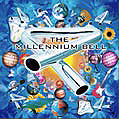
RS: Do you have any plans for the period after the release of Tubular Bells 2003?
MO: I don’t know really what kind of album to make next yet. I’ll try to make a Tubular Bells kind of album. For me, I learned a lot remaking it—you know how to combine this sort of progressive kind of composition and structure with modern technology. So I learnt alot...or I’ve this idea a long time to do something quite experimental using lots of quarter tones. Alot of pitch bend, instead of using just the 13 notes in music you use all those notes in between, which would probably sound out of tune but I’d like to experiment with that. I’m also working on my virtual reality project, called MusicVR. I’m working on TubeWorld now which is a kind of computer game, kind of flight sequencer which uses music and has real-time 3-D graphics. Also people can play with each other over the internet in the same game in the same virtual world. You can see all of it on mikeoldfield.com You can even download a demo of it. So there’s those things plus I’ve got to finish off my helicopter! (laughter) That should keep me busy for some time, I don’t know how long.
RS: Could you say something about how George Harrison influenced you and your guitar playing?
MO: The thing I remember most about him was the song actually, “All Things Must Pass”. I was having a particularly bad time around about the time of Tubular Bells and that song gave me a lot of support you know, sort of saying this will get better. Also the classic guitar solos like on “Something”. It’s a loss...a great loss. He seemed a very genuine person.
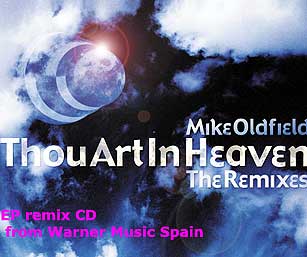
RS: Speaking of George Harrison, I hear they're planning a George Harrison tribute concert next November 29th in L.A. Mike Pinder from The Moody Blues is also interested in playing there. It would be amazing to hook you up with them!
MO: I gave up working with other people a long time ago. I was never any good at collaborations. I think the last collaboration I did was Pekka Pohjola. (laughter)
RS: Well never say never...
MO: Yeah, never say never.
RS: Also I’m interested to know if you have a live archive with BBC stuff or unreleased concert material in the vault?
MO: Well, it’s funny you should say that because the very original Tubular Bells concert from 1973, somebody’s found that. It was recorded by the BBC TV. There was talk about releasing some of it on the audio DVD that’s coming out. There’s obviously some space on it for some images. And it will have some parts of concerts I did...one at Edinburgh castle and one in the center of London for Tubular Bells 3, which was in the Prime Minister’s back garden almost. So there’s the possibility that some of that might come out and I still have the Tubular Bells demos and I’m thinking of putting them out somewhere, somehow but I don’t know what yet.
RS: That would be great. Like with Todd Rundgren, they’re starting to put out his live archive series. You’ve gone through so many musical styles and phases. I saw you play in Stockholm in 1981.
MO: Did you?
RS: Yeah it was an outdoor concert just after QE2 came out.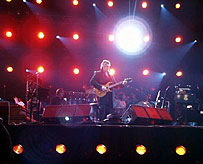
MO: Oh! In the Tivoli Garden?...
RS: Not Copenhagen, in Stockholm...
MO: It was, that was in the...I don’t know what they call it...it was this fun fair outside. That was another good one. I remember that, alot.
MO: Oh, that was called The Ritz wasn’t it?
RS: It was a stand up place.
MO: We played somewhere called My Father’s House.
RS: My Father’s Place.
MO: My Father’s Place. And we played at The Ritz.
RS: The Ritz is no more.
MO: Is it gone?
RS: Is it possible to draw a line of comparison between the great classical masterpieces of the past and the music you’ve recorded over the years? If someone hears your music in fifty or a hundred years they’ll probably consider you a 20th Century Mozart or Beethoven.
MO: That’s nice of you to say so. You know what my biggest wish is? That alot more individuals come along and say, make music that’s really different rather than sort of trying to follow the crowd and be hip and cool. To really stand up and want to stand out as making something different but, using musical talent rather than relying on technology and image, looks, hairdos, makeup and all this kind of stuff..hopefully. The most individual music that happens now...there’s a lot of people working in the dance scene. I know they use lots of little music from other people and then they add bits on their own but I think we need lots more individuals saying, ‘I’m going to do what the hell I like, I don’t care if anybody likes it or not because this is the music I want to make.’ That kind of attitude would be great.
RS: Which guitars are most prominent on the new TB2003 album?
MO: There’s a full list of them on the album cover with the make and the model and the date.
RS: I know you told me about the blond Telecaster from ‘66 that used to belong to Marc Bolan.
MO: Yeah and the pink Strat from 1962. I use Paul Reed Smith guitars alot for complicated stuff. And Spanish guitars, I’ve got two Ramirez, from Madrid. They’re the top classical guitars. A Flamenco and a normal classical. I use Wall basses. I’ve got a four string and a five string. I’ve got my favorite old Martin—an ancient old thing from the ‘50s, Martin D something or other.
RS: I heard you have an L6S, an Abbey Road guitar?
MO: L6S? What’s that? Oh, the Gibson! That tends to be one of the things that sort of stays on the wall. You know, since I got the PRS’s, I love the action so much that I tend to use those now. Also, one of then has got a computer interface so it connects directly to this Roland guitar system, VG8. And with that I can generate MIDI and control other things.
RS: Your guitar sound has got to up with there with all the great...

MO: Thank you.
RS: You’re also playing Fender Guitars again.
MO: Fenders? I’ve got the original two of those guitars. This Telecaster, like I told you and I use that most of the time on the rerecording. But I have a beautiful old pink Stratocaster which has this very special sound, there’s no other guitar like it. It goes through this system of electronics which I rescued from the original Manor studios and I’ve got it boxed up. It’s got this various editions, noise gates and stuff. It’s just got this lovely clarity with a little bit of throatiness, a little bit of character and I used that alot on the rerecording.
RS: What kind of strings are you using. Do you have a special selection of strings?
MO: I used to. But I have to have a look in the string box! (laughter) I used to be very fussy about strings, y’know? I always used to use Fender. Yeah, I use Fender with a 9 on the top and a 15 on the third. Just to be honest, I used to be a bit of, obviously, a guitar fanatic, but as the years go, I don’t really play very much in my spare time. I don’t sit and practice. When I need to play because I’m making a track, I pick it up and just play it. It’s still there. I do love my guitars. I’ve got some beautiful ones. But I’m not so fanatical about them as I used to be. I have a guitar technician. When I start a project he comes up and spends the whole day setting up the frets and restringing them, making sure they’re all beautiful and then that’ll last me that album, the whole setting up of them.
RS: So you don’t consider yourself a guitar collector?
MO: Well, I’m not really a collector but I suppose if you look at my guitars you’d say I have a collection. But I use every one of them. They’re tools. Just like a craftsman has a workshop full of the best tools he can find to do his job. And they’re my tools. I love them all and they’re beautiful ones but they’re not there because I like
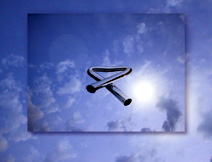 that make or model. It’s just that I’ve tried things and this is the only instrument that gives me that sound that allows me to express things in a certain way and they all have their own character and they’re all good at one thing and not so good at another.
that make or model. It’s just that I’ve tried things and this is the only instrument that gives me that sound that allows me to express things in a certain way and they all have their own character and they’re all good at one thing and not so good at another.RS: One last thing. You’ve said "I love the philosophy that everything that happens to you is the perfect thing to happen to you - even if you can't see it at the time. And if you can accept that, instead of struggling to be something else, you're well on the path to having a peaceful life." Any other words of wisdom you can impart to the readers?
MO: I suppose I agree with that. It must have been quite a while ago I said that. Thank you for reminding me! (laughter) I like that! Did I really say that? I would just say that again really. I’m sort of trying to learn how to chill out a bit, not be so intense about things. I’ve always been working on some huge project my whole life and I want to try and not have to do that. Just to enjoy, I don’t know, going for nice walks, sitting on the beach, taking my dog out. You know, the simple things. I suppose you call it semi-retirement if you like. I want to be content with what I’ve done and what I’ve got and I how I am and not have to struggle so much anymore. It’s a dream...I’m working on it.
RS: Sounds like you’re well on the way. You’ve made so such great music over the years and it’s just a fantastic legacy. 49 years...it’s great.
MO: That’s fantastic, thank you.
luisfsl dijo:
Es una entrevista muy buena. Ya la había encontrado, no recuerdo donde, hace varios años y luego le perdí la pista. Ha sido interesante volver a leerla. Es larga, y hay que dedicarle un poco de tiempo, pero vale la pena.
huender dijo:
Ay Hombre tengo la misma edad que Mike, Y parece que ambos suffrimos de perder la memoria.
Buen Interview, si senor.
_SentineL_ dijo:
alguien podria traducirla????
killing bell dijo:
LA verdad es k memoria , lo k se dice buena memoria, no tiene el tito Mike..k tío, no se acuerda de nada!!!
Interesante entrevista
Caveman IV dijo:
¿Podría alguien traducir esta entrevista a la lengua de Cervantes?
Gracias.
senseless dijo:
Buena entrevista.
meich dijo:
+1 en lo de traducir la entrevista
Se prohibe copiar cualquier contenido de esta web sin el consentimiento expreso del autor.
Esta web ha sido desarrollada en su totalidad por Mike-Bell. Copyright © 2000-2005.
Traducción al Español por Mike-Bell. Artwork by Krenes
Esta página se ve correctamente con Internet Explorer 6 y Netscape 7. Resolución recomendada 1024x768 o superior
